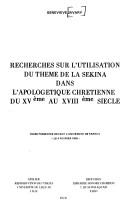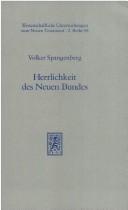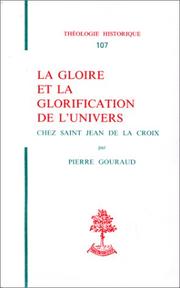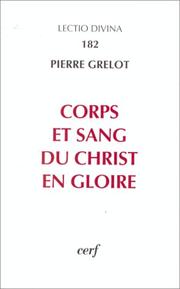| Listing 1 - 10 of 10 |
Sort by
|

ISBN: 2729500758 9782729500757 Year: 1978 Publisher: Paris: Champion,
Abstract | Keywords | Export | Availability | Bookmark
 Loading...
Loading...Choose an application
- Reference Manager
- EndNote
- RefWorks (Direct export to RefWorks)
Presence of God --- Glory of God --- Apologetics --- History of doctrines --- Christianity --- History --- -God --- Schechinah --- Shechina --- Shechinah --- Shekhinah --- Shekina --- Shekinah --- God --- Presence --- Omnipresence --- Theses --- History of doctrines. --- History. --- -History of doctrines --- Divine glory --- Glorification (Theology) --- Glory, Divine --- God, Glory of --- Christianity&delete& --- Glory --- Presence of God - History of doctrines --- Glory of God - Christianity - History of doctrines --- Apologetics - History
Book
ISBN: 9783506756220 3506756222 3657756221 9783657756223 Year: 2008 Publisher: Paderborn : Verlag Ferdinand Schöningh,
Abstract | Keywords | Export | Availability | Bookmark
 Loading...
Loading...Choose an application
- Reference Manager
- EndNote
- RefWorks (Direct export to RefWorks)
Die Herrlichkeit Gottes – einer der zentralsten Begriffe in der biblischen Theologie. Unzwei-felhaft ist aber festzustellen, dass die gegenwärtige Theologie den Begriff vermeidet. Als Gründe sind u.a. die Theodizeeproblematik, die anthropologische Wende und philosophische Infragestellungen zu nennen. Allerdings ist unschwer aufzuzeigen, dass die Sprache der Transzendenz durch den Verlust verarmt. Der vorliegende Band will zu einem verantwortlichen Gebrauch des Wortes anregen und diese zentrale theologische Kategorie in der Diskussion neu beleben.
Doctrine of God (christianism) --- Glory of God --- God --- 22.08*01 --- 22.08*01 Bijbelse theologie: God; Godsleer --- Bijbelse theologie: God; Godsleer --- Metaphysics --- Misotheism --- Theism --- Divine glory --- Glorification (Theology) --- Glory, Divine --- God, Glory of --- Glory --- Glory of God. --- God. --- Rezeption. --- Herrlichkeit Gottes. --- Theologie. --- Katholische Theologie. --- Bibel.
Book
ISBN: 9789004303225 9789004307650 9004303227 9004307656 Year: 2016 Publisher: Leiden ; Boston : Brill.
Abstract | Keywords | Export | Availability | Bookmark
 Loading...
Loading...Choose an application
- Reference Manager
- EndNote
- RefWorks (Direct export to RefWorks)
In this study on the kābôd of YHWH biblical texts are approached from a canonical perspective, and the synchronic approach prevails over the diachronic. Ben Sira characterized Ezekiel as the prophet who saw the appearance of the glory of God. This characterization is not based on the number of occurrences of kābôd in Ezekiel. The peculiarity of Ezekiel is that kābôd is used almost exclusively as a hypostasis of YHWH. Ezekiel’s description of the kābôd of YHWH is more elaborate than any other Old Testament writer’s, and it highlights the dual and paradoxical nature of the divine kābôd as both defying verbal description and being potentially visible. This research highlights especially the importance of the visible aspect.
Glory of God --- Biblical teaching. --- Bible. --- Criticism, interpretation, etc. --- 224.4 --- Divine glory --- Glorification (Theology) --- Glory, Divine --- God --- God, Glory of --- Biblical teaching --- Ezechiël --- Glory --- Esŭgel (Book of the Old Testament) --- Ezechiel (Book of the Old Testament) --- Ezekiel (Book of the Old Testament) --- Ezekieli (Book of the Old Testament) --- Hesekiel (Book of the Old Testament) --- Yechezkel (Book of the Old Testament) --- Yeḥezḳel (Book of the Old Testament)
Book
ISBN: 9789004339613 9004339612 9789004342170 9004342176 Year: 2017 Publisher: Leiden Boston
Abstract | Keywords | Export | Availability | Bookmark
 Loading...
Loading...Choose an application
- Reference Manager
- EndNote
- RefWorks (Direct export to RefWorks)
Despite its centrality in mainstream linguistics, cognitive semantics has only recently begun to establish a foothold in biblical studies, largely due to the challenges inherent in applying such a methodology to ancient languages. The Semantics of Glory addresses these challenges by offering a new, practical model for a cognitive semantic approach to Classical Hebrew, demonstrated through an exploration of the Hebrew semantic domain of glory. The concept of ‘glory’ is one of the most significant themes in the Hebrew Bible, lying at the heart of God’s self-disclosure in biblical revelation. This study provides the most comprehensive examination of the domain to date, mapping out its intricacies and providing a framework for its exegesis.
221.02*1 --- 221.02*1 Oud Testament: bijbelse filologie: hebreeuws --- Oud Testament: bijbelse filologie: hebreeuws --- Hebrew language --- Glory --- Glory of God --- Fame --- Divine glory --- Glorification (Theology) --- Glory, Divine --- God --- God, Glory of --- Semantics. --- Biblical teaching. --- Etymology. --- Bible. --- Antico Testamento --- Hebrew Bible --- Hebrew Scriptures --- Kitve-ḳodesh --- Miḳra --- Old Testament --- Palaia Diathēkē --- Pentateuch, Prophets, and Hagiographa --- Sean-Tiomna --- Stary Testament --- Tanakh --- Tawrāt --- Torah, Neviʼim, Ketuvim --- Torah, Neviʼim u-Khetuvim --- Velho Testamento --- Language, style.
Book
ISBN: 9789004223370 9789004225237 9004225234 1283470799 9786613470799 9004223371 Year: 2012 Volume: 151 Publisher: Leiden BRILL
Abstract | Keywords | Export | Availability | Bookmark
 Loading...
Loading...Choose an application
- Reference Manager
- EndNote
- RefWorks (Direct export to RefWorks)
Die Untersuchung des Begriffs kābôd JHWH im Alten Testament weist drei Profile einer biblischen kābôd-Theologie auf. Während die altorientalischen Quellen die Wurzel kbd / kbt jeweils mit der Bedeutung 'Schwere' oder 'ehren' verwenden, entwickelten es die biblischen Autoren in einem längerem Traditionsprozess zu einem Aspekt göttlicher Gegenwart fort. Die Studie zeigt, dass die Priesterschrift, das Buch Jesaja und das Buch Ezechiel unterschiedliche Motive aus unterschiedlichen Quellen, biblischen und nicht-biblischen aufnahmen und auf diese Weise drei literarische Profile des göttlichen kābôd. Die Untersuchung späterer Pentateuch- und Jesajatexte weist auf Wechselwirkungen hin, während die Vorstellungen des Ezechielbuches nicht weiter aufgenommen wurden. The investigation focusses on the meaning and function of the term kābôd JHWH in the Hebrew Bible and presents three profiles of kābôd-Theology. While Ancient Near Eastern sources contain the root kbd / kbt always with the meaning 'heaviness' or 'to hounour', in biblical texts the authors developed the term towards an aspect representing his presence. The study shows that the Priestly sources of the Pentateuch, the Book of Isaiah and the Book of Ezekiel contain different images deriving from various sources - bilibcal and non-biblical - forming three literary profiles of the divine kābôd. The investigation of later Pentateuchal and Isaian texts shows that these texts interact while the profile of the Ezekialian tradition was not incorprated anymore.
Glory of God --- God --- Biblical teaching --- Worship and love --- Bible. A.T. Commentaires --- Bible --- Criticism, interpretation, etc --- 221.08*01 --- God (Christianity) --- God (Judaism) --- Biblical teaching. --- Theologie van het Oude Testament: God--(Godsleer) --- Bible. --- Antico Testamento --- Hebrew Bible --- Hebrew Scriptures --- Kitve-ḳodesh --- Miḳra --- Old Testament --- Palaia Diathēkē --- Pentateuch, Prophets, and Hagiographa --- Sean-Tiomna --- Stary Testament --- Tanakh --- Tawrāt --- Torah, Neviʼim, Ketuvim --- Torah, Neviʼim u-Khetuvim --- Velho Testamento --- Criticism, interpretation, etc. --- 221.08*01 Theologie van het Oude Testament: God--(Godsleer) --- Metaphysics --- Misotheism --- Monotheism --- Religion --- Theism --- Divine glory --- Glorification (Theology) --- Glory, Divine --- God, Glory of --- Worship and love&delete& --- Glory --- Glory of God - Biblical teaching --- God - Worship and love - Biblical teaching
Book
ISBN: 9782204106498 2204106496 Year: 2016 Volume: 269 Publisher: Paris: Cerf,
Abstract | Keywords | Export | Availability | Bookmark
 Loading...
Loading...Choose an application
- Reference Manager
- EndNote
- RefWorks (Direct export to RefWorks)
La gloire, kabôd en hébreu, est un terme très fréquent dans la Bible, qu’il s’applique à Dieu ou à l’homme. Pourtant son usage, son étymologie, ses dérivations lexicologiques et sémantiques, n’avaient pas jusqu’ici fait l’objet d’études approfondies et systématiques. Giovanna Maria Porrino se livre à ce travail avec finesse et érudition, montrant quel double sens de « pesanteur » et d’« aura » revêt ce mot crucial, qui fut traduit en doxa dans le texte grec. À quel jeu d’opposition aussi se livrent les rédacteurs inspirés de l’Ancien Testament, et notamment des livres de la Genèse, de l’Exode, des Proverbes et des Psaumes sur lesquels elle se concentre, qui montrent que ce qui fait choir Pharaon est ce qui glorifie Dieu, comme pour une annonce générale du Messie souffrant et humilié à venir.Cette vaste étude qui suit autant les commentaires de saint Augustin que ceux de Rachi éclaire d’un jour nouveau le Dieu vétéro-testamentaire et les hommes de foi à qui il communique par participation sa gloire.Giovanna Maria Porrino a étudié à Bratislava et à Fribourg. Membre de la communauté des Focolari, suivant une intuition de la fondatrice Chiara Lubich, elle a travaillé sur la notion de Gloire dans l’Ancien Testament.
Glory of God --- Glory --- Gloire de Dieu --- Gloire --- Religious aspects --- Biblical teaching --- Aspect religieux --- Enseignement biblique --- Bible --- Criticism, interpretation, etc. --- Glory of God. --- 221.08*01 --- Divine glory --- Glorification (Theology) --- Glory, Divine --- God --- God, Glory of --- Theologie van het Oude Testament: God--(Godsleer) --- Bible. --- Antico Testamento --- Hebrew Bible --- Hebrew Scriptures --- Kitve-ḳodesh --- Miḳra --- Old Testament --- Palaia Diathēkē --- Pentateuch, Prophets, and Hagiographa --- Sean-Tiomna --- Stary Testament --- Tanakh --- Tawrāt --- Torah, Neviʼim, Ketuvim --- Torah, Neviʼim u-Khetuvim --- Velho Testamento --- 221.08*01 Theologie van het Oude Testament: God--(Godsleer) --- Biblical teaching.
Multi
ISBN: 9783868350517 3868350519 Year: 2012 Publisher: Münster : Ugarit-Verlag,
Abstract | Keywords | Export | Availability | Bookmark
 Loading...
Loading...Choose an application
- Reference Manager
- EndNote
- RefWorks (Direct export to RefWorks)
Akkadian language. --- Assyro-Babylonian literature --- God --- Glory of God --- Akkadien (Langue) --- Littérature assyro-babylonienne --- Dieu --- Gloire de Dieu --- History and criticism. --- Attributes. --- Biblical teaching. --- Histoire et critique --- Attributs --- Enseignement biblique --- Bible. --- Language, style. --- Akkadian language --- Attributes of God --- Divine glory --- Glorification (Theology) --- Glory, Divine --- God, Glory of --- Accadian language --- Assyrian language --- Assyro-Babylonian language --- Babylonian language --- Semitic languages --- History and criticism --- Biblical teaching --- Attributes --- Glory --- Antico Testamento --- Hebrew Bible --- Hebrew Scriptures --- Kitve-ḳodesh --- Miḳra --- Old Testament --- Palaia Diathēkē --- Pentateuch, Prophets, and Hagiographa --- Sean-Tiomna --- Stary Testament --- Tanakh --- Tawrāt --- Torah, Neviʼim, Ketuvim --- Torah, Neviʼim u-Khetuvim --- Velho Testamento

ISBN: 3161460626 9783161460623 Year: 1993 Volume: 55 Publisher: Tübingen: Mohr,
Abstract | Keywords | Export | Availability | Bookmark
 Loading...
Loading...Choose an application
- Reference Manager
- EndNote
- RefWorks (Direct export to RefWorks)
Glory of God --- Biblical teaching. --- 22.08*01 --- 2 VON BALTHASAR, HANS URS --- -Divine glory --- Glorification (Theology) --- Glory, Divine --- God --- God, Glory of --- Bijbelse theologie: God; Godsleer --- Godsdienst. Theologie--VON BALTHASAR, HANS URS --- Biblical teaching --- Glory --- Balthasar, Hans Urs von --- Theses --- -Bijbelse theologie: God; Godsleer --- 2 VON BALTHASAR, HANS URS Godsdienst. Theologie--VON BALTHASAR, HANS URS --- 22.08*01 Bijbelse theologie: God; Godsleer --- -22.08*01 Bijbelse theologie: God; Godsleer --- Divine glory --- Balthasar, Hans Urs von, --- Bible. --- Ba-yon Tipan --- Bagong Tipan --- Jaji ma Hungi --- Kainē Diathēkē --- New Testament --- Nouveau Testament --- Novo Testamento --- Novum Testamentum --- Novyĭ Zavet --- Novyĭ Zavi︠e︡t Gospoda nashego Īisusa Khrista --- Novyĭ Zavit --- Nuevo Testamento --- Nuovo Testamento --- Nye Testamente --- Perjanjian Baru --- Dhamma sacʻ kyamʻʺ --- Injīl --- Criticism, interpretation, etc. --- Glory of God - Biblical teaching.

ISSN: 05634253 ISBN: 2701013720 2701017211 9782701013725 Year: 1998 Volume: 107 Publisher: Paris: Beauchesne,
Abstract | Keywords | Export | Availability | Bookmark
 Loading...
Loading...Choose an application
- Reference Manager
- EndNote
- RefWorks (Direct export to RefWorks)
Glory --- Glory of God --- Mystical union --- Religious aspects --- Christianity --- John of the Cross, --- 248 JOANNES A CRUCE --- -Glory of God --- God and man, Mystical union of --- Indwelling of God --- Mystic union --- Unio mystica --- Union, Mystical --- Union with Christ --- Immanence of God --- Mysticism --- Divine glory --- Glorification (Theology) --- Glory, Divine --- God --- God, Glory of --- Fame --- Spiritualiteit. Ascese. Mystiek. Vroomheid--JOANNES A CRUCE --- -Christianity --- John of the Cross Saint --- Religious aspects&delete& --- Alvarez, Juan de Yepes y, --- Giovanni della Croce, --- Ioann Kresta, --- Jan od Krzyża, --- Jean de la Croix, --- Joan, --- Joannes a Cruse, --- Joannes van het Kruis, --- João da Cruz, --- Johannes av Korset, --- Johannes vom Kreuz, --- John, --- Juan de la Cruz, --- Juan, --- Juan de Santo Matía, --- Św. Jan od Krzyża, --- Yepes, Juan de, --- Yepes y Alvarez, Juan de, --- Ĭoan vid Khresta, --- Йоан від Хреста, --- Glory - Religious aspects - Christianity --- Glory of God - Christianity --- John of the Cross, - Saint, - 1542-1591

ISSN: 07501919 ISBN: 2204063010 9782204063012 Year: 1999 Volume: 182 Publisher: Paris: Cerf,
Abstract | Keywords | Export | Availability | Bookmark
 Loading...
Loading...Choose an application
- Reference Manager
- EndNote
- RefWorks (Direct export to RefWorks)
Christology --- Lord's Supper --- -Glory of God --- Real presence --- Christianity --- Jesus Christ --- Resurrection --- Appearances --- Presence --- Blood --- Biblical teaching --- 225*2 --- 248.159.23 --- Glory of God --- -Communion --- Eucharist --- Holy Communion --- Sacrament of the Altar --- Sacraments --- Sacred meals --- Last Supper --- Mass --- Divine glory --- Glorification (Theology) --- Glory, Divine --- God --- God, Glory of --- Jezus Christus in het Nieuwe Testament: christologie --- Devotie tot het lijden van Jezus Christus. Kruisweg --- Religious aspects --- Glory --- -Jesus Christ --- -Christ --- Cristo --- Jezus Chrystus --- Jesus Cristo --- Jesus, --- Jezus --- Christ, Jesus --- Yeh-su --- Masīḥ --- Khristos --- Gesù --- Christo --- Yeshua --- Chrystus --- Gesú Cristo --- Ježíš --- Isa, --- Nabi Isa --- Isa Al-Masih --- Al-Masih, Isa --- Masih, Isa Al --- -Jesus, --- Jesucristo --- Yesu --- Yeh-su Chi-tu --- Iēsous --- Iēsous Christos --- Iēsous, --- Kʻristos --- Hisus Kʻristos --- Christos --- Jesuo --- Yeshuʻa ben Yosef --- Yeshua ben Yoseph --- Iisus --- Iisus Khristos --- Jeschua ben Joseph --- Ieso Kriʻste --- Yesus --- Kristus --- ישו --- ישו הנוצרי --- ישו הנצרי --- ישוע --- ישוע בן יוסף --- المسيح --- مسيح --- يسوع المسيح --- 耶稣 --- 耶稣基督 --- 예수그리스도 --- Jíizis --- Yéshoua --- Iėsu̇s --- Khrist Iėsu̇s --- عيسىٰ --- -Biblical teaching --- -Jezus Christus in het Nieuwe Testament: christologie --- -Appearances --- 248.159.23 Devotie tot het lijden van Jezus Christus. Kruisweg --- 225*2 Jezus Christus in het Nieuwe Testament: christologie --- -Divine glory --- Communion --- Consubstantiation --- Christ --- Appearances. --- Biblical teaching. --- Presence. --- Resurrection. --- عيسىٰ --- Lord's Supper - Real presence --- Glory of God - Christianity --- Jesus Christ - Resurrection --- Jesus Christ - Appearances --- Jesus Christ - Presence --- Jesus Christ - Blood - Biblical teaching
| Listing 1 - 10 of 10 |
Sort by
|

 Search
Search Feedback
Feedback About UniCat
About UniCat  Help
Help News
News